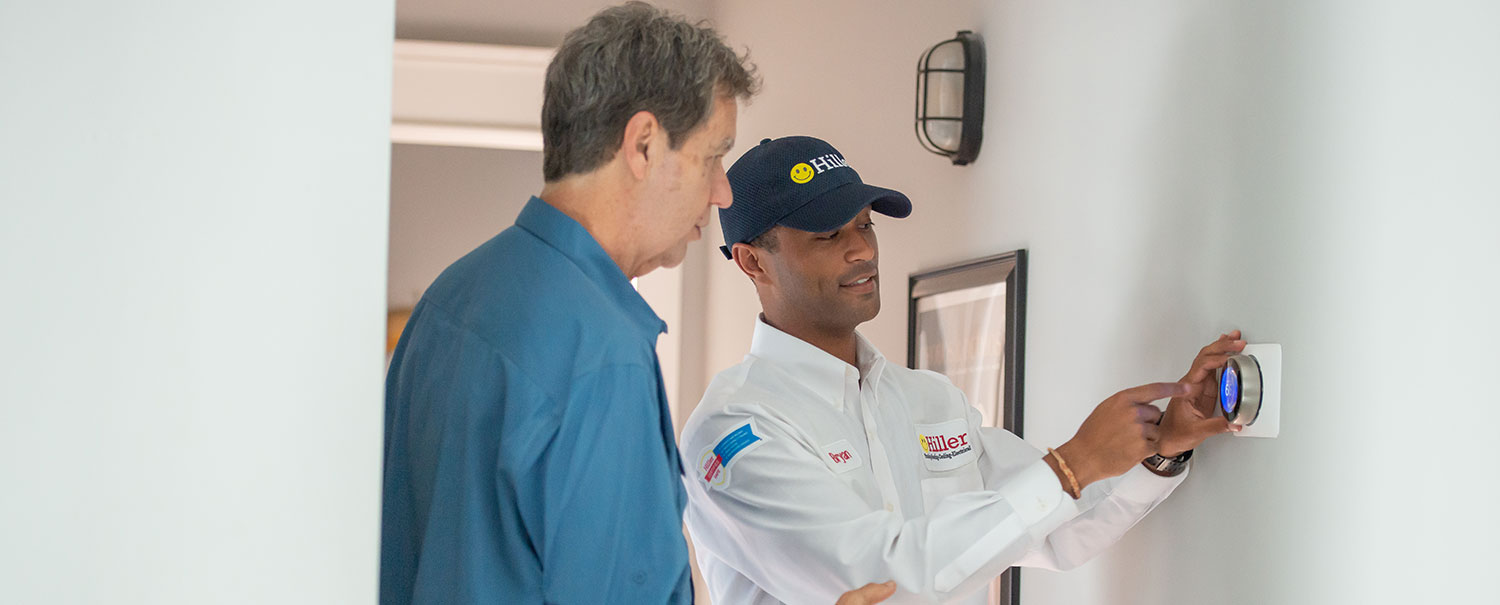The Essential HVAC Maintenance Checklist
Enjoy reading the latest DIY articles and saving money?
Receive our latest helpful hints, tricks and savings, directly to your inbox.
Posted October 18, 2019
Did you know that your air conditioning system can last up to 12-15 years or longer? The life of a unit depends on several factors including proper HVAC maintenance, the age of the system, and if you opt for regular professional care.
We’re going to take a look at the maintenance routine you should follow to keep your HVAC running for years. We will also touch on what to expect from a professional tune-up and knowing when it is best to replace or repair your unit.
Keep reading for more information!
Replace Your Air Filters
You don’t see the air filters in your home on a daily basis and they are quite easy to forget about. Unfortunately, forgetting about them can mean your HVAC system works harder to keep your home cool, putting stress on the entire unit.
Aside from overworking your unit, you may find that your home doesn’t feel quite as cool, becomes dusty faster, and face higher energy bills. To combat this, your filters need changing every month.
An easy way to remember to change your air filters is by setting a particular date. The day you pay your energy bill is ideal because this task will save you money each month on that bill!
Air filters range in prices and changing them every month can add up. Just remember that buying the most expensive brand doesn’t mean it’s the best. Ask our technicians for recommendations on the best air filter brands for your home.
The timeline for changing your air filters are suggestions. The best way to tell if your air filters need changing is to look at them–a grey filter means it is dirty whereas a white one may have a bit longer before a change is needed.
Noticing more dust on your furniture than usual or feeling like your floors constantly have pet hair and dirt on them are other telltale signs of dirty filters.
Clean The Ductwork
As your HVAC system ages, it is only natural for your ductwork to get dirty, dusty, and even clogged. The problem with this is that a blockage in your ducts prevents air from being blown throughout the house.
When cool air cannot reach the areas of your home that need it, you will find that your system runs constantly. This means that your HVAC is working harder than it should to keep your home cool which can have a negative effect on the unit’s lifespan.
Cleaning your ductwork is not a DIY job but typically is only required every 3-5 years. During the cleaning, the technician will inspect your ducts for leaks and proper insulation.
Having clean ductwork will ultimately allow your AC to cycle normally which ultimately allows your unit to last longer. Because your unit won’t have to work so hard, you can expect to see lower electric bills and of course, better air quality.
HVAC Maintenance: Take It Outside
To properly maintain your HVAC system, you will need to look at the outside components of your system. Is there debris blocking this part of your unit? Is there grass and weeds growing around the area?
Ideally, the answer to these questions is, ‘no.’ When the answer is yes, you will need to be sure to remove anything that is blocking the unit and leave a clear radius of at least two feet.
Most people don’t realize that the outside component to your HVAC system is just as important as the indoor parts. If this area is blocked, the evaporator coils cannot release the heat that is trapped in the refrigerant as efficiently.
If the heat cannot be released quickly, the refrigerant will not be able to absorb as much heat from your home. This leaves your home feeling a bit too warm and your AC working harder than it should in an attempt to keep your home cool.
In addition to clearing debris, leaves, and grass, you may also choose to clean the unit. To do this, be sure that the power is off. You can use a soft brush and stream of water from the hose to clean the built-up dust.
After the dirt is gone, use a fin-straightening tool (a butter knife works fine) to ensure that the fins aren’t bent and preventing airflow.
Check For & Seal Air Leaks
During an air duct cleaning, the technician will check for leaks in the ducts. This is great to ensure your HVAC is able to function properly. Unfortunately, if your home has other air leaks, you may not feel any improvement.
To ensure that your HVAC system doesn’t have unneeded wear & tear, ensure that all doors, windows, and electric outlets do not have small leaks. This can be done by a professional, or you can opt to do it yourself.
To check for air leaks, you will need incense and a windy day. Close the doors, windows, and chimney flue; then shut off any appliance that blows air in or outside. This includes the dryer, ceiling fans, and vents.
Light the incense and pass it in front of the areas already mentioned as well as light switches, baseboards, and fans. If you notice that the smoke blows differently around these areas, there is likely a leak.
Leaks around doors and windows may be sealed by weatherstripping or door sweeps. For air leaks in other areas, you will likely need caulking or foam sealant. If you aren’t sure about how to seal a problem area, call a professional for insight.

Update The Thermostat
Part of HVAC maintenance is updating parts of your system as needed. This includes your thermostat as an older model may cause your HVAC system to run constantly or not at all. Not all thermostats require batteries, but if yours does, replacing them is an easy way to ensure this unit operates properly.
It is best to consider a digital or smart thermostat, as these are easy to use and program.
A digital thermostat is also known as a programmable thermostat–most homes have these. This type of thermostat allows you to set a comfortable temperature and senses when the air is too warm or cool. This tells the HVAC system to turn on and off when the ideal temperature is met.
Smart thermostats offer this ability but also ‘learn’ your household’s behavior. Their adaptiveness will be able to sense when you are not home, keeping the system off or running minimally.
You will find that the use of either of these thermostats will help decrease your electric bill but also keep your system from overworking itself.
Know Signs of Failure
Part of HVAC maintenance is knowing when to call for repairs. Not all repairs require emergency servicing but you shouldn’t wait until your unit completely stops working, either.
Of course, you will want to call for help if your unit is not cooling or heating your home and in extreme temperatures, opt to do this sooner than later. If you have medical issues, children, or elderly people living in your home, an emergency call is advised.
Other signs that you may need professional repairs can include:
- Rattling or other noises
- Inconsistent temperatures
- Very little air coming through vents
- Spikes in electric bills
Each of these signs can indicate that something is wrong. The trick to keeping your HVAC system working for years to come is to not ignore the issue, but instead, fix it quickly. Repairs that are left undone may create bigger issues down the road which result in bigger bills or the need to completely replace the unit.
Professional Tune-Ups
Even with the best DIY HVAC maintenance, you will still need an annual professional tune-up. A technician will be able to dive deep into your system to check for wiring and electric issues as well as inspect & clean every component of the unit.
A tune-up may include evaporator coil cleaning, air handler cleaning, and checking the refrigerant levels. Each step of a professional tune-up is designed to help identify and correct potential problems before they become major issues which will save you money on repairs and prevent a too-soon replacement.
When to Replace
All of the maintenance in the world cannot keep an HVAC system working forever. Unfortunately, many companies will try to sway you to repair when you should replace and vice versa.
There is a simple equation of when to replace versus when to repair a unit and it goes like this: if the cost of a new unit is less than the repair cost multiplied by the age of the unit, opt for the new unit.
For example, if a new unit is $5000 and your current unit will cost $400 in repairs and is 5 years old, repair the unit.
You may not prefer to do this math, so you may wish to consider other guidelines. Units that are older than 10-12 years and require expensive repairs need replacing. Irregular maintenance, high energy bills, and odd cycling are also indicators.
Additionally, if you are finding that your refrigerant needs to be topped off and your unit uses R22, a replacement is advisable. This is because R22 refrigerant is being phased out due to its harmful environmental effects. It is, therefore, becoming more expensive to use and more difficult to find.
You may not mix this type of refrigerant with the new R-410A which will become problematic in the not so distant future.
Once you replace your unit, be sure to follow the above maintenance tips to avoid extra repairs or early system failure.

HVAC Maintenance Clubs
Many HVAC companies are beginning to offer maintenance plans and clubs. These plans don’t always save the consumer money and can often be misleading. This is not the case with ALL maintenance clubs but is something to be aware of.
If you choose to join an HVAC (or any) maintenance club, be sure to look at the benefits versus the cost of individual repairs and DIY maintenance. When a maintenance club is beneficial, it will offer discounts on repairs, priority scheduling, and replacement credits.
When choosing a maintenance club or plan, be sure that the company offers to keep records for warranty purposes. This helps ensure your warranty stays intact which will save you money over time!
The other huge benefit of opting for a maintenance club is the fact that you won’t have to worry too much about keeping up with your unit. Yes, you will still have to change your air filter, but you can rely on professional technicians to do the rest!
Heating & Cooling Maintenance: The Takeaway
When your HVAC system runs efficiently, your home stays comfortable, your electric bills are more affordable, you avoid costly repairs, and can ensure your system lasts for years to come.
With this said, even simple HVAC maintenance will go a long way toward keeping your system working perfectly. Do-it-yourself cleaning and repairs are great for minor issues, but knowing when to call a professional is also helpful.
There is nothing wrong with needing help to perform standard maintenance or not being sure where to start. If this is ever the case, don’t be ashamed to call a professional–we are trained in this field of expertise!
If you would like to schedule an annual tune-up, need help with regular maintenance, or simply have questions regarding your unit, request an appointment! We are more than happy to help!
 Daily Promotion
Daily Promotion
$500 Off Tankless Water Heater
Upgrade your comfort and give back this season.
Get Promotion